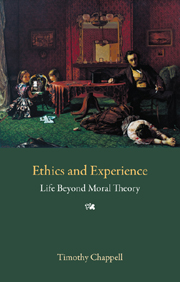Book contents
- Frontmatter
- Contents
- Acknowledgements
- 1 The turn to reason: how human beings got ethical
- 2 Demarcation: what does “ethical” mean?
- 3 Motivation: why be moral?
- 4 Deliberation: the question of reason
- 5 Introducing subjectivism and objectivism
- 6 Five arguments for ethical subjectivism
- 7 The content of ethics: expressivism, error theory, objectivism again
- 8 Virtue ethics
- 9 Utilitarianism
- 10 Kantianism and contractarianism
- 11 Theory and insight in ethics
- Further reading
- Bibliography
- Index
8 - Virtue ethics
- Frontmatter
- Contents
- Acknowledgements
- 1 The turn to reason: how human beings got ethical
- 2 Demarcation: what does “ethical” mean?
- 3 Motivation: why be moral?
- 4 Deliberation: the question of reason
- 5 Introducing subjectivism and objectivism
- 6 Five arguments for ethical subjectivism
- 7 The content of ethics: expressivism, error theory, objectivism again
- 8 Virtue ethics
- 9 Utilitarianism
- 10 Kantianism and contractarianism
- 11 Theory and insight in ethics
- Further reading
- Bibliography
- Index
Summary
[We might] look for “norms” in human virtues: just as man has so many teeth, which is certainly not the average number of teeth men have, but is the number of teeth for the species, so perhaps the species man, regarded not just biologically, but from the point of view of the activity of thought and choice in regard to the various departments of life – powers and faculties and use of things needed – “has” such and such virtues: and this “man” with the complete set of virtues is the “norm”, as “man” with, e.g., a complete set of teeth is a norm.
(G. E. M. Anscombe, “Modern Moral Philosophy”, in Geach & Gormally 2005: 188)Introducing normative ethics
The central question of ethics, with which I began this book, is “How should life be lived?”. That question raises further questions about truth and falsity, subjectivity and objectivity, the meaning of ethical claims, and what the world has to be like for them to be capable of being true. These questions form the agenda of meta-ethics, which I have been pursuing in the previous three chapters especially.
The last of these meta-ethical questions was “What are we talking about when we make moral assertions?”. Among the possible ways of answering this, as we saw, are the views that the content of moral discourse is shaped by our nature as a zoological species (biological naturalism); by what contributes to our happiness (welfarist naturalism); by what reason tells us to do, think, or be (rationalism); and by what moral perception tells us to do, think, or be (intuitionism).
- Type
- Chapter
- Information
- Ethics and ExperienceLife Beyond Moral Theory, pp. 97 - 124Publisher: Acumen PublishingPrint publication year: 2009

